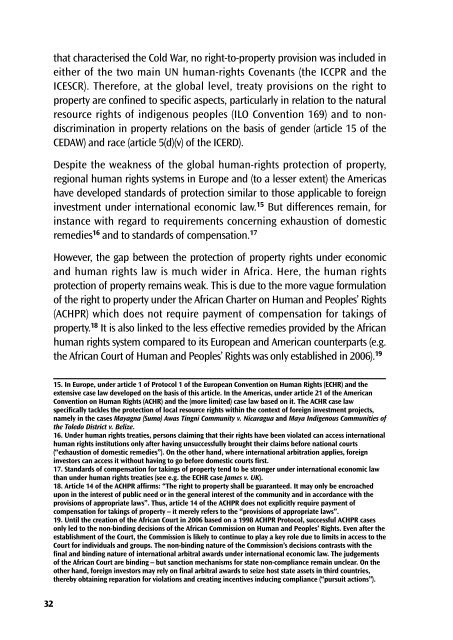Legal empowerment for local resource control
Legal empowerment for local resource control
Legal empowerment for local resource control
You also want an ePaper? Increase the reach of your titles
YUMPU automatically turns print PDFs into web optimized ePapers that Google loves.
32<br />
that characterised the Cold War, no right-to-property provision was included in<br />
either of the two main UN human-rights Covenants (the ICCPR and the<br />
ICESCR). There<strong>for</strong>e, at the global level, treaty provisions on the right to<br />
property are confined to specific aspects, particularly in relation to the natural<br />
<strong>resource</strong> rights of indigenous peoples (ILO Convention 169) and to nondiscrimination<br />
in property relations on the basis of gender (article 15 of the<br />
CEDAW) and race (article 5(d)(v) of the ICERD).<br />
Despite the weakness of the global human-rights protection of property,<br />
regional human rights systems in Europe and (to a lesser extent) the Americas<br />
have developed standards of protection similar to those applicable to <strong>for</strong>eign<br />
investment under international economic law. 15 But differences remain, <strong>for</strong><br />
instance with regard to requirements concerning exhaustion of domestic<br />
remedies 16 and to standards of compensation. 17<br />
However, the gap between the protection of property rights under economic<br />
and human rights law is much wider in Africa. Here, the human rights<br />
protection of property remains weak. This is due to the more vague <strong>for</strong>mulation<br />
of the right to property under the African Charter on Human and Peoples’ Rights<br />
(ACHPR) which does not require payment of compensation <strong>for</strong> takings of<br />
property. 18 It is also linked to the less effective remedies provided by the African<br />
human rights system compared to its European and American counterparts (e.g.<br />
the African Court of Human and Peoples’ Rights was only established in 2006). 19<br />
15. In Europe, under article 1 of Protocol 1 of the European Convention on Human Rights (ECHR) and the<br />
extensive case law developed on the basis of this article. In the Americas, under article 21 of the American<br />
Convention on Human Rights (ACHR) and the (more limited) case law based on it. The ACHR case law<br />
specifically tackles the protection of <strong>local</strong> <strong>resource</strong> rights within the context of <strong>for</strong>eign investment projects,<br />
namely in the cases Mayagna (Sumo) Awas Tingni Community v. Nicaragua and Maya Indigenous Communities of<br />
the Toledo District v. Belize.<br />
16. Under human rights treaties, persons claiming that their rights have been violated can access international<br />
human rights institutions only after having unsuccessfully brought their claims be<strong>for</strong>e national courts<br />
(“exhaustion of domestic remedies”). On the other hand, where international arbitration applies, <strong>for</strong>eign<br />
investors can access it without having to go be<strong>for</strong>e domestic courts first.<br />
17. Standards of compensation <strong>for</strong> takings of property tend to be stronger under international economic law<br />
than under human rights treaties (see e.g. the ECHR case James v. UK).<br />
18. Article 14 of the ACHPR affirms: “The right to property shall be guaranteed. It may only be encroached<br />
upon in the interest of public need or in the general interest of the community and in accordance with the<br />
provisions of appropriate laws”. Thus, article 14 of the ACHPR does not explicitly require payment of<br />
compensation <strong>for</strong> takings of property – it merely refers to the “provisions of appropriate laws”.<br />
19. Until the creation of the African Court in 2006 based on a 1998 ACHPR Protocol, successful ACHPR cases<br />
only led to the non-binding decisions of the African Commission on Human and Peoples’ Rights. Even after the<br />
establishment of the Court, the Commission is likely to continue to play a key role due to limits in access to the<br />
Court <strong>for</strong> individuals and groups. The non-binding nature of the Commission’s decisions contrasts with the<br />
final and binding nature of international arbitral awards under international economic law. The judgements<br />
of the African Court are binding – but sanction mechanisms <strong>for</strong> state non-compliance remain unclear. On the<br />
other hand, <strong>for</strong>eign investors may rely on final arbitral awards to seize host state assets in third countries,<br />
thereby obtaining reparation <strong>for</strong> violations and creating incentives inducing compliance (“pursuit actions”).

















